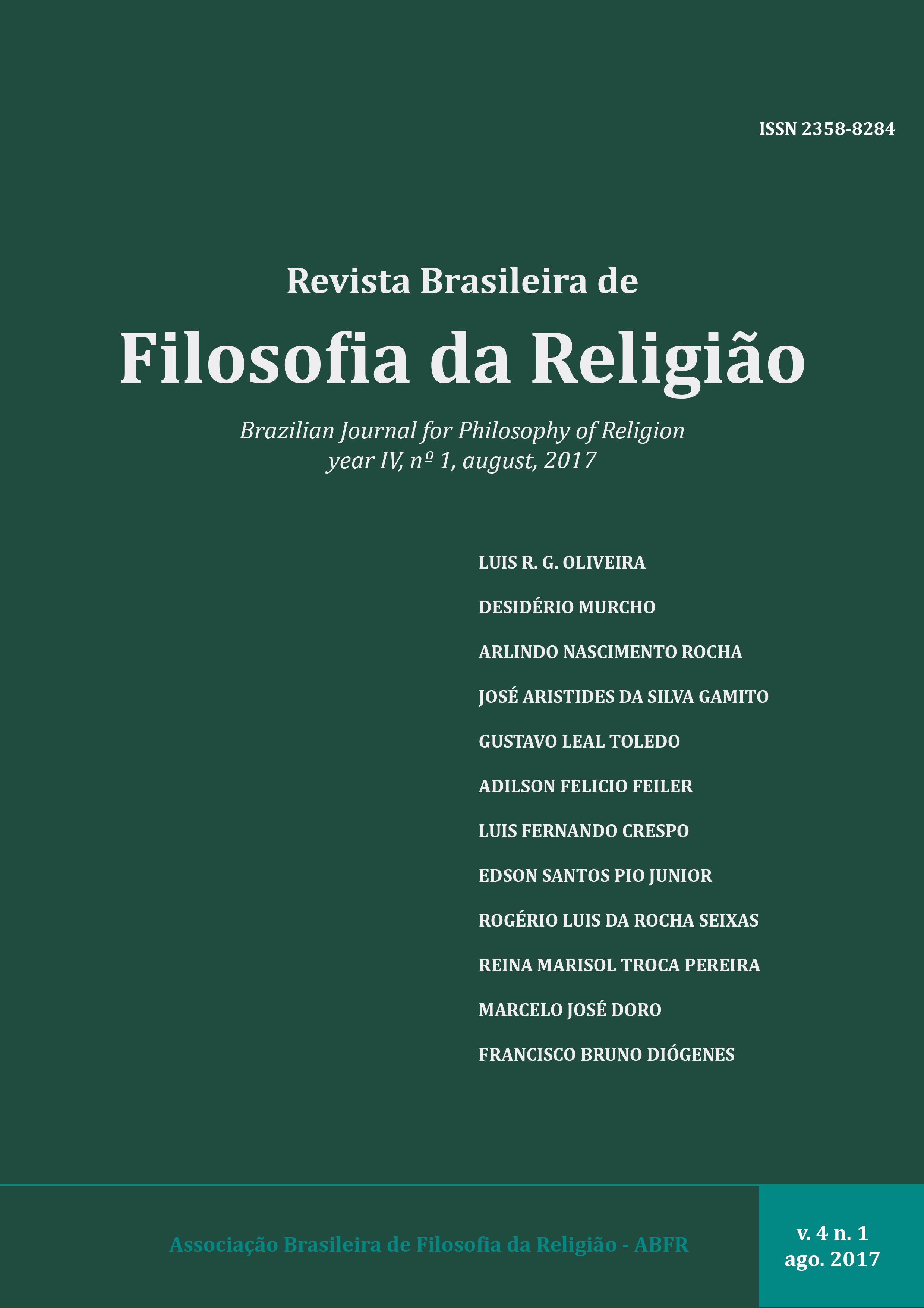NIETZSCHE AND THE á¼Î³ÏŽ εἰμι: THE DOUBLE CHARACTER OF AFFIRMATIVE ETHIC OF JESUS
DOI:
https://doi.org/10.26512/2358-82842017e17693Keywords:
Ethic, affirmation, Jesus, practice, NietzscheAbstract
The expression “I am” joins in itself all that dimension of affirmation of yourself. This affirmation, at the same time, that show all of itself also reserves big part of that could show the scope of mystery, of non said, of unsaid, but not say for not empty itself. This is the intention of Evangelist John by occasion of wording of his Gospel ”“ Reaffirm all of that density of liberty and action typical of Judaism, when God himself of Israel says of himself that Is who is. Saying that is, on the one hand, reveals a metaphysical character, and, on the other hand, an existential character, that is, cannot frame in only one category, but is open to all. Before of these two characters how Nietzsche appreciates the dimension of ethical affirmation, that so clearly it appears of Jesus practice?
Downloads
References
BIBLIA HEBRAICA. Stuttgart: Priv. Württ. Bibelanstalt, 1937.
BIBLIA DO PEREGRINO. São Paulo: Paulus, 2002.
COPLESTON, Frederick. Friedrich Nietzsche: philosopher of culture. London: Burns, Oates & Washbourne, 1979.
DOSTOIEVSKI, Fiódor. O idiota. São Paulo: Editorial 34, 2002.
FIGL, Johann. Nietzsche und die Religionen: trankulturelle perspectiven seines bildungs- und Denkweges. Berlim, Walter de Gruyter, 2007.
GIACÓIA JÚNIOR, Oswaldo. Nietzsche. São Paulo: Publifolha, 2000.
HEGEL, G. W. F. Der Geist des Christentums und sein Schicksal (1798/1800): Der Geist des Judentums, Der Geist des Christentums. In: HEGEL, G. W. F. Frühe Schriften. Frankfurt: Suhrkamp Taschenbuch, 1994. Werk 1, p. 317-418. (Suhrkamp Taschenbuch Wissenschaft, 601).
JANZ, Curt Paul. Friedrich Nietzsche. Biographie. München: Carl Hansen Verlag, 1978. Bd. 4.
_____. Friedrich Nietzsche. Uma biografia. Vozes: Petrópolis, 2016. Vol. II.
KAUFMANN, Walter. Nietzsche, philosopher, psychologist, antichrist. Princeton: Princeton University Press, 1968.
KÜNG, Hans. Ser cristão. Rio de Janeiro: Imago, 1976.
LANDA, Ishay. The overman in the marketplace: Nietschean horoism in popular culture. Lanham: Lexington Books, 2009.
MARTON. Scarlett. In: Dicionário Nietszche. Coleção Sendas e Veredas. São Paulo: Edições Loyola, 2016.
MOREL, G. Nietzsche: Introduction à une première lecture. Paris: Aubier, 1985.
NIETZSCHE, F. W. Der Antichrist. In: COLLI, von Giorgio; MONTINARI, Mazzino (Herausgegeben). Kritische Studienausgabe. Berlin: Verlag de Gruyter, 1969. Bd. 6.
______. Nachgelassene fragmente: herbst 1887 bis märz 1888. In: COLLI, von Giorgio; MONTINARI, Mazzino (Herausgegeben). Achte Abteilung. Berlin: Walter de Gruyter, 1970. Bd. 2.
______. Briefe an Friedrich Nietzsche: januar 1880 ”“ dezenber 1884. In: COLLI, von Giorgio; MONTINARI, Mazzino (Harausgegeben). Dritte Abteilung. Berlin: Walter de Gruyter, 1981. Bd. 2.
______. F. W. O anticristo, maldição do cristianismo e Ditirambos de Dionísio. Companhia das Letras: São Paulo, 2007.
NOVUM TESTAMENTUM. Graece et Latine. Romae: Sumplibus Pontificii Instituti Biblici, 1964.
OTTAVIANI, Edélcio. Práxis de Jesus e praxis de libertação à luz do anticristo de Nietzsche. Revista Filosófica, Porto Alegre, v. 19, n. 24, p. 79-109, 2007.
PLANT, Raymond. Hegel. Bloomington: Indiana University Press, 1973.
REMPEL, Morgan. Nietzsche, psychohistory and the birth of christianity. Westpont: Greenwood Press, 1964.
SLOTERDIJK, Peter. O quinto “Evangelho” de Nietzsche. Rio de Janeiro: Tempo Brasileiro, 2004.
SOLOMON, Robert; SCHOCKEN, Kathleen M. Higgins. What Nietzsche really said? New York: Books, 2000.
STEGMAIER, Werner. Nietzsche como destino da filosofia e da humanidade? Interpretação contextual do § 1 do capítulo “Por que sou um destino”, de Ecce Homo. In: Trans/Form/Ação, Marília, v.33, n.2, p.241-278, 2010.
THE NEW Oxford annoted Bible: new revised standard version with the Apocrypha. New York: Oxford University Press, 2001.
VALADIER, Paul. Nietzsche et la critique du christianisme. Paris: Du Cerf, 1974.
_____. Dionysus versus the crucified. In: ALLISON, David (Ed.). The new Nietzsche. Cambridge: The MIT Press, 1985.
WAKE, Peter. Tragedy in Hegel's early theological writings. Bloomington: Indiana University Press, 2014. (Indiana Series in the Philosophy of Religion). Disponível em: <http://www.iupress.indiana.edu/product_info.php?products_id=807191>. 20 ago. 2014.

